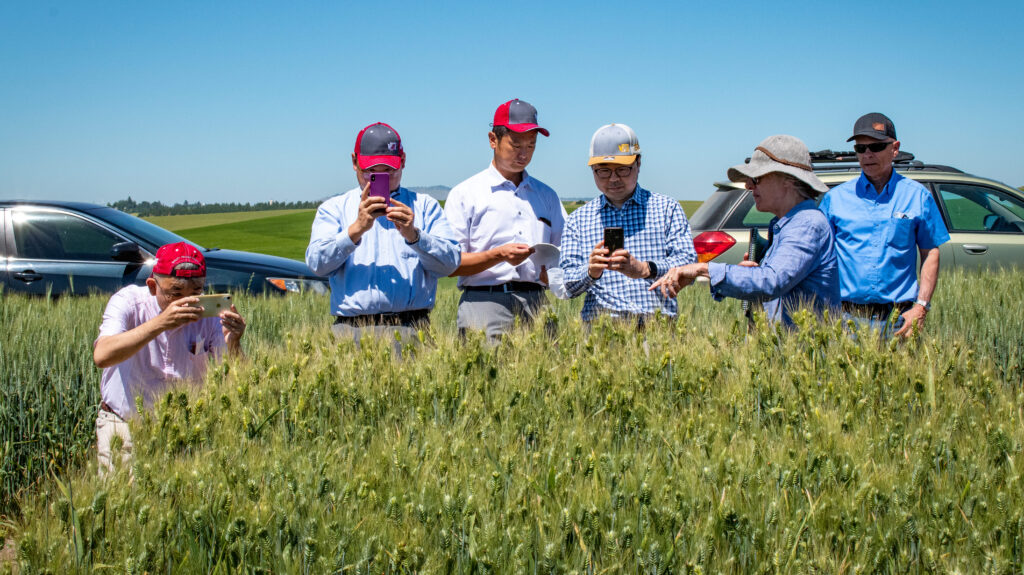The Coalition to Promote U.S. Agricultural Exports
Coalition to Promote U.S. Agricultural Exports Applauds Introduction of the SMART Act, Doubling Investments in Agricultural Export Programs
November 3, 2022
WASHINGTON, D.C. —The Coalition to Promote U.S. Agricultural Exports applauds Representatives Jim Costa (D-CA-16), Dan Newhouse (R-WA-04), Jimmy Panetta (D-CA-20), Tracey Mann (R-KS-01), Cindy Axne (D-IA-03), and Ashley Hinson (R-IA-01) for introducing the Supporting Market Access to Reinvigorate Trade Act of 2022 (SMART Act), which would double funding for USDA’s Market Access Program (MAP) and Foreign Market Development (FMD) Program. Both programs are critical to expanding global market access for U.S. produced agricultural exports.
A recent econometric study conducted by agricultural economists at IHS Market and Texas A&M University predicted that doubling funding for these programs would generate an additional $44.4 billion in U.S. agricultural exports over the 2024-2029 time period. This would directly benefit farmers, livestock producers, dairy operators and small businesses as they work to maintain and expand their global presence.
“Reinvestment in export promotion programs is needed now. USDA is forecasting a U.S. agricultural trade deficit in 2023 for the first time in years because the growth in American farm exports is not keeping pace with imports, signaling a more competitive global landscape then we’ve experienced before,” said Robbie Minnich, director of Washington operations for the National Cotton Council, and chair of the Coalition to Promote U.S. Agricultural Exports. “With so much uncertainty about the future of U.S. global trade policy amidst geopolitical conflict, this additional investment is an essential piece of trade promotion policy that our farmers can utilize to reinforce our competitive standing in overseas markets.”
“Global competition is getting harder for American farmers. As a cooperative of citrus growers, MAP has shown that farmer dollars, in partnership with USDA, are necessary for making the American citrus farmer more competitive,” said Rayne Thompson, vice president of Sunkist Growers, and vice-chair of the Coalition to Promote U.S. Agricultural Exports. “These programs are key to reaching more consumers and growing demand for U.S. food and fiber.”
The legislation must now be considered within the Agriculture Committee, and the Coalition urges the Committee to swiftly consider and pass this important bill.

The Coalition to Promote U.S. Agricultural Exports is a group of 150 organizations focused on protecting and enhancing U.S. agricultural export promotion programs to help America’s agricultural industry reach more consumers and compete in a dynamic global marketplace. Read more at www.AgExportsCount.org.
The U.S. Wheat Associates (USW) mission is to “develop, maintain, and expand international markets to enhance wheat’s profitability for U.S. wheat producers and its value for their customers.” USW activities in more than 100 countries are made possible through producer checkoff dollars managed by 17 state wheat commissions and cost-share funding provided by USDA’s Foreign Agricultural Service. USW maintains 15 offices strategically located around the world to help wheat buyers, millers, bakers, wheat food processors and government officials understand the quality, value and reliability of all six U.S. wheat classes. For more information, visit www.uswheat.org.
###
Contacts:
Steve Mercer, Vice President of Communications, U.S. Wheat Associates
(913) 449-4134 / smercer@uswheat.org
Robbie Minnich, Director of Washington Operations, National Cotton Council
202-745-7805 / [email protected]
